Local SEO - A Case Study
How Do You Do Local SEO?
It's quite clear that local SEO will be *one* of the places to be in 2010 and beyond. Need convincing?
Check out:

- Google and Yelp's failed deal - If local search was unlikely to see a decent ongoing up tick, Google might not have as much interest in acquiring a site like Yelp. Even if Google was just buying Yelp out to remove competition for it's own local stuff, it still shows an acknowledgement that local search is quite important.
- Google's Flat Rate Local Adwords Pricing Model aimed at local businesses
- Google's Local Business Center is becoming a more and more robust service.
- The local 10 Pack continues to show up in general service related queries. Local SEO is also about gaining visibility in Google's 10 pack and maps in general so it is equally as important to be optimized for your geo-specific keywords as it is to be set up to succeed in the local pack
Speaking of the local 10 pack, it appears to have done part of its job for Google. Consider the following from TMPDM/ComScore
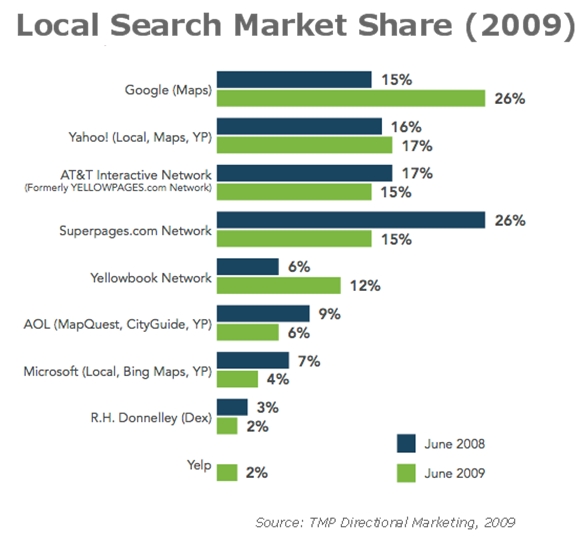
So Google's maps increased sharply, likely due to the local 10 pack being shoved down people's throats. I happen to like the 10 pack to some degree, more when I type in a town/city + service instead of my town + service because lots of times they pull from my IP which is a ways away from where I am now, which kind of renders the initial map findings a bit useless for me. I also like it much better when it takes up #4 in the rankings rather than having be at spot 1 or 2
The Process
One of the nice things about local SEO for me is that I don't have to fuss around with a bazillion different keyword tools, cross reference data points, wonder which data sets are more accurate (and which ones are entirely useless), or spend time creating a site structure which ultimately has to be redesigned after finding some some of the keyword data was rubbish.
There are a few ways get a general idea of which keywords you should incorporate in your campaign. You can use tools like Google Trends, Google Insights, as well as PPC campaigns. You can also look at competing sites to see how they structure their page or site in order to target specific keywords.
A Case Study
So you just spoke at a local chamber of commerce meeting in your hometown of Atlanta and now you have the locals all fired up about search marketing. You end up landing a client named Mary Smith who owns Peachy Insurance Agency which has offices in Atlanta, Savannah, Macon, and Athens.
Mary has decided her agency is going to focus on vehicle insurance only. So she asks you to begin the process of figuring out which keywords best suit her goals. Will it be broader geo-local keywords (on the state level) or pursuing really local keywords (down to the town level) or both?
In this case, we have to figure out if car insurance or auto insurance is the more popular keyword in this specific area. I would start with the Adwords Keyword Tool to figure out if there is any big difference from a broad perspective
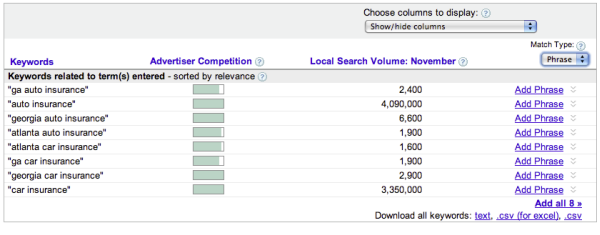
It appears that the modifier georgia and "auto" is a bit more popular (but it is pretty easy to work in other variations like the state abbreviation into your on-page copy)
Then I would head over to Google Insights for additional data points, one targeted to the state and one broader country wide search with local modifiers
Broad Search with modifiers
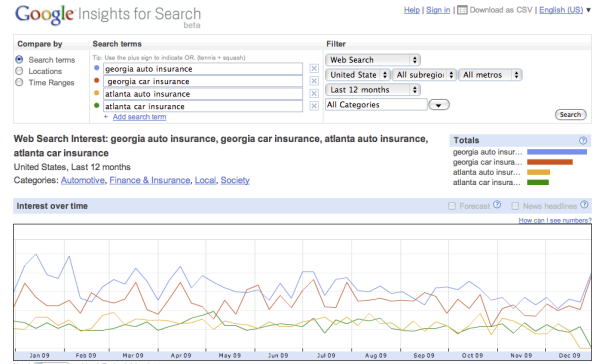
Broad Keywords but geo-targeted by region
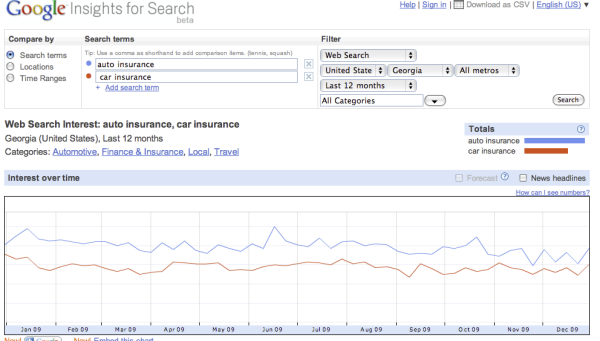
Lastly, from a tool standpoint, I would give google trends a shot. They break out volume by town/city but I would still test that heavily in Adwords.
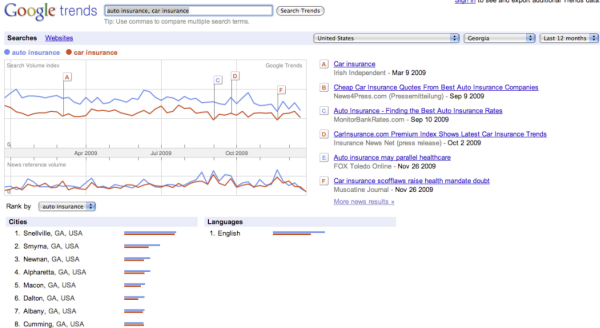
My next step would be to type in some keywords, since the difference is not huge and trying to target both might be a good move
Note the local box on the more niche, local search. Also, note how some sites target both car/auto. From a relevancy standpoint, Mary's site should be able to do pretty well in these SERPS as a local resource guide, a local insurance agency, and a site which is not essentially a lead generation site. If Mary can create content which is valuable to the local community, earn local links, promote the site in local communities, etc.. she should do pretty well when compared to either thinner affiliate sites or one page off-shoots on a large lead generation domain.
Georgia Auto Insurance

Georgia Car Insurance
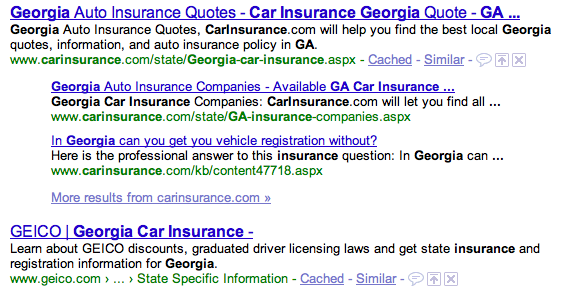
Atlanta Auto Insurance
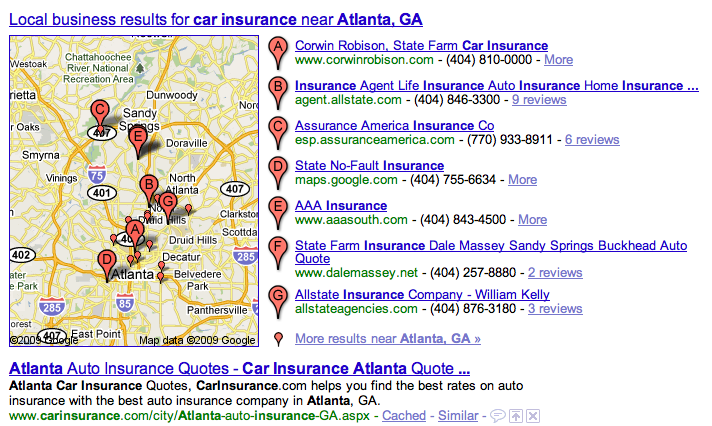
Atlanta Car Insurance
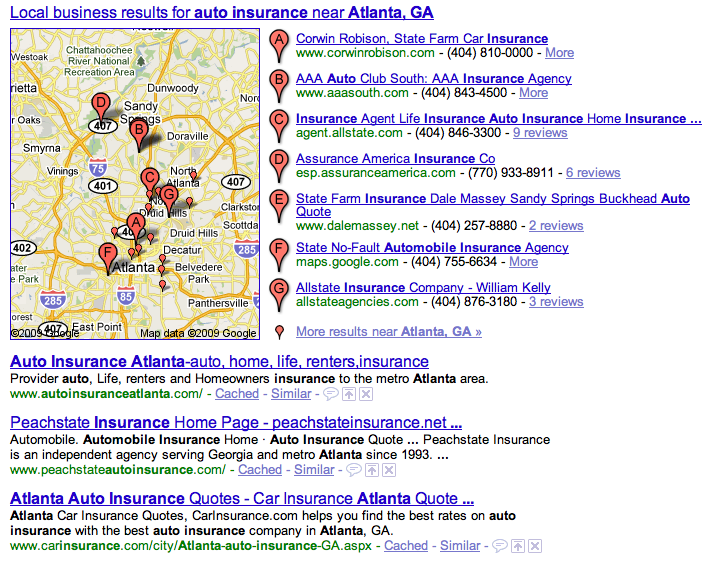
The best way to figure out local keyword volume, or really any keyword's volume in most cases, is to set up an adwords campaign. I like to set up 2 PPC campaigns:
- Campaign 1 - no radius targeting, targeting keywords with specific geo-local modifiers (georgia auto insurance, car insurance in atlanta, etc)
- Campaign 2 - targeting by maps (state of Georgia and specific zip codes) with no geo-local modifiers (auto insurance quotes, car insurance quotes) etc.
So that second option will probably be fairly pricey but the long term payoffs of making sure you or your client are optimized for the correct keyword variations in your market are much bigger than any nominal PPC campaign costs.
Conclusions
So the volume might not be huge but keep in mind this is a local insurance agency. They may not be able to scale their operation with a huge firehose of traffic (say the 10's of thousands places like Geico and Progressive receive per day), it is all relative.
You might proceed as follows:
- Go with the state level keywords on the home page and try and grab the exact match if possible (either GeorgiaAutoInsurance.Com or GeorgiaCarInsurance.Com depending on what your PPC campaign tells you has the higher volume)
- Target towns/cities on individual pages like
peachyinsurance.com/atlanta-auto-insurance.com
Most of the time local SERPS are ripe if you can figure out which angle you want to pursue, be able to execute it, and have a client willing to spend some capital
Must have resources, for me, when launching an SEO campaign is to browse through the local search ranking factors and see how I can apply them to my client's site. Also, I am a big fan of Andrew Shotland's Local SEO Guide & understanding Google maps & local search.




Comments
All of that reading made me thirsty. I think I'll have some vanilla coke! :)
Now that I've quenched my thirst, I think you're absolutely right regarding the potential of the local search market. Most of my clients, as well as my SEO business, primarily target the local market. Once people get over the idea they are missing traffic - traffic they don't have to begin with - by filling up their home page with every city, state, subdivision, etc., they begin to realize how much potential there is right in their back yard. And with the growth of geo-targeting, properly optimizing for it can be very rewarding.
Especially with Google pushing down the organic results.
Good read. Your insight in local opportunities is very helpful. Thanks. The case study format is also a nice way to make hypotheticals a little more concrete. Looking forward to hearing more from you.
Thanks for the kind words Marty! Enjoy that beverage Wezley :-)
First off VC thanks for including me in this excellent post. I love how you have succinctly captured some of the basics of local seo keyword targeting.
The TMP chart is the real story here. While it's hard to correlate this data with the multiple local-related changes the Google SERPs have gone through over the past year, it's certainly lines up with what I am seeing across a large number of sites - there are more sites competing for local rankings, and Google is getting more effective at driving web search traffic to Google Maps results, which is causing a lot of issues for the rest of the local search world.
Should be an interesting '010...
Hi Aaron and thx for the continuing education . . . one enormous data-point that is always skirted around by TMP and others when discussing local search market share or usage is the fact that the majority of local searches use the Google main Web index to look for local businesses versus going to Google Maps expressly. If the use of Google Maps expressly is what is being shown in the TMP chart, then there is a massive gap in documenting real-world local search activity owing to the omission of searches through the main Google Web index. However, if the Google Maps 7 or 10 or 1-Box shown in the main Google Web index is indeed directly connected to the Google Maps market share as shown in the TMP graph, then I believe the data is a lot more credible. Thx again. Tim T
Hi Tim
1.) the above post was from our new writer Eric, so I can't take credit for the great work he has done :D
2.) I agree with you 100% that the TMP numbers are skewed by a lack of counting insertion in traditional search results. I believe there is no way they are counting those (or at the minimum are under-counting those) because there is no way that at&t + superpages combined are creating more online local search volume that Google is.
In fact, if you listen to CEOs from Dex and Superpages they talk about how part of their job is buying keywords for clients, doing social media for clients, creating videos for clients, doing SEO for clients, etc. They don't own the distribution the way Google does...they are only trying to influence it. One of their quotes in a recent interview Mr. Swanson (from RHD) was "Most of the time today, you are not even realizing that you are interacting with us" if that doesn't hint that their business is in a weak position I don't know what does!
Good post Eric, thanks for the work.
I wanted to question one of your suggestions --
that is, setting up individual pages for different towns.
In my experience with getting listed on Google Maps, setting up different location pages within a single site can be risky. Google LBC is only going to give you one real bite at the location apple -- if you are geo-targetted by Google into one location, that tends to be the whole ballgame. Having other pages referring to other locations may look a bit like an attempt at spamming. All depends how it is set up.
Of course, having other location pages can be helpful in organic, non-LBC rankings, but even there, you are not likely to get broad coverage for all your towns.
If the insurance company has four distinct locations, four micro sites, or a main site and 3 micro sites, may be a better way to go.
hi,
any tips on optimization by local google search
not the places.google.com
I have successfully done an optimzation on
www.google.com.SG (singapore)
then I have a huge challenge doing the same keyword for the site on
www.google.com.MY, www.google.com.HK
anyone has any experience on local google.com engine?
Another general Q:
for places.google.com; not all the "location name"+keyword has a places.google.com
how do we know which keyword+ location has a "places.google.com"
Add new comment